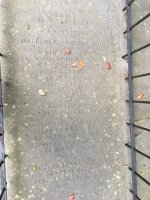Björn Bergenholtz
(former alias "Calalp")

While following the path of the well-known German ornithologist, herpetologist and collector Hermann Schlegel (1804–1884), commemorated in several birds (here) I stumbled upon this eponym ...
algondae as in:
• the subspecies (or species?) Foudia eminentissima algondae SCHLEGEL 1867 (here) as "Ploceus algondæ, Pollen" (!), no dedication, nor any explanation what so ever (in the OD), also see intro, here, but with a reference to a forthcoming work, which is this one; here (& plate, here):
Which leads to one short question:
– Who is the dear sister Algonda?
The Eponym Dictionary of Birds, 2014 (here) as well as today's HBW Alive Key explains this eponym as:
In any case it seems hard to find a sister to Schlegel ... by the name Algonda. To me this looks like a far more common name of a Dutch girl?
Also see this link, here (if you understand Dutch); Een Duitse familie in Nederland (1804-1913): Carrièrisme en netwerken van Hermann Schlegel en zijn zonen Gustav en Leander, by Bob van Zijderveld, 2014. Looks (more than) well researched! In that book especially check the introduction starting on p.25 ... and onwards, also look at pp. 150-155, for a certain "Albertinae"! ... "Æigidia Johanna (1823-1905)" ... ??
Anyone knowing more than me (or is better at searching)?
Or have I simply gone all astray?
Björn
_______________________________
*the Dutch naturalist François Paul Louis Pollen (1842–1866), collector in Madagascar and also on Mayotte (the type's origin), here
algondae as in:
• the subspecies (or species?) Foudia eminentissima algondae SCHLEGEL 1867 (here) as "Ploceus algondæ, Pollen" (!), no dedication, nor any explanation what so ever (in the OD), also see intro, here, but with a reference to a forthcoming work, which is this one; here (& plate, here):
This bird is also mentioned, in text, in the first part of Recherches sur la faune de Madagascar et de ses dépendances, on p.107 (here).Cette nouvelle espèce que j'ai dédiée à ma chère soeur Algonda , a été découverte par nous dans l'île de Mayotte. Elle y porte le nom de Cardinal, à cause de sa ressemblance avec le Foudi de Madagascar, qui porte ce nom dans l'île de la Réunion.
Which leads to one short question:
– Who is the dear sister Algonda?
The Eponym Dictionary of Birds, 2014 (here) as well as today's HBW Alive Key explains this eponym as:
But is the former quote truly the words of Schlegel? Aren´t those words written by François Pollen* (in litteris)? As I don´t understand French it´s hard for me to tell either way.algondae
Algonda Schlegel (fl. 1866) sister of German ornithologist Hermann Schlegel (Foudia).
In any case it seems hard to find a sister to Schlegel ... by the name Algonda. To me this looks like a far more common name of a Dutch girl?
Also see this link, here (if you understand Dutch); Een Duitse familie in Nederland (1804-1913): Carrièrisme en netwerken van Hermann Schlegel en zijn zonen Gustav en Leander, by Bob van Zijderveld, 2014. Looks (more than) well researched! In that book especially check the introduction starting on p.25 ... and onwards, also look at pp. 150-155, for a certain "Albertinae"! ... "Æigidia Johanna (1823-1905)" ... ??
Anyone knowing more than me (or is better at searching)?
Or have I simply gone all astray?
Björn
_______________________________
*the Dutch naturalist François Paul Louis Pollen (1842–1866), collector in Madagascar and also on Mayotte (the type's origin), here
Last edited:





